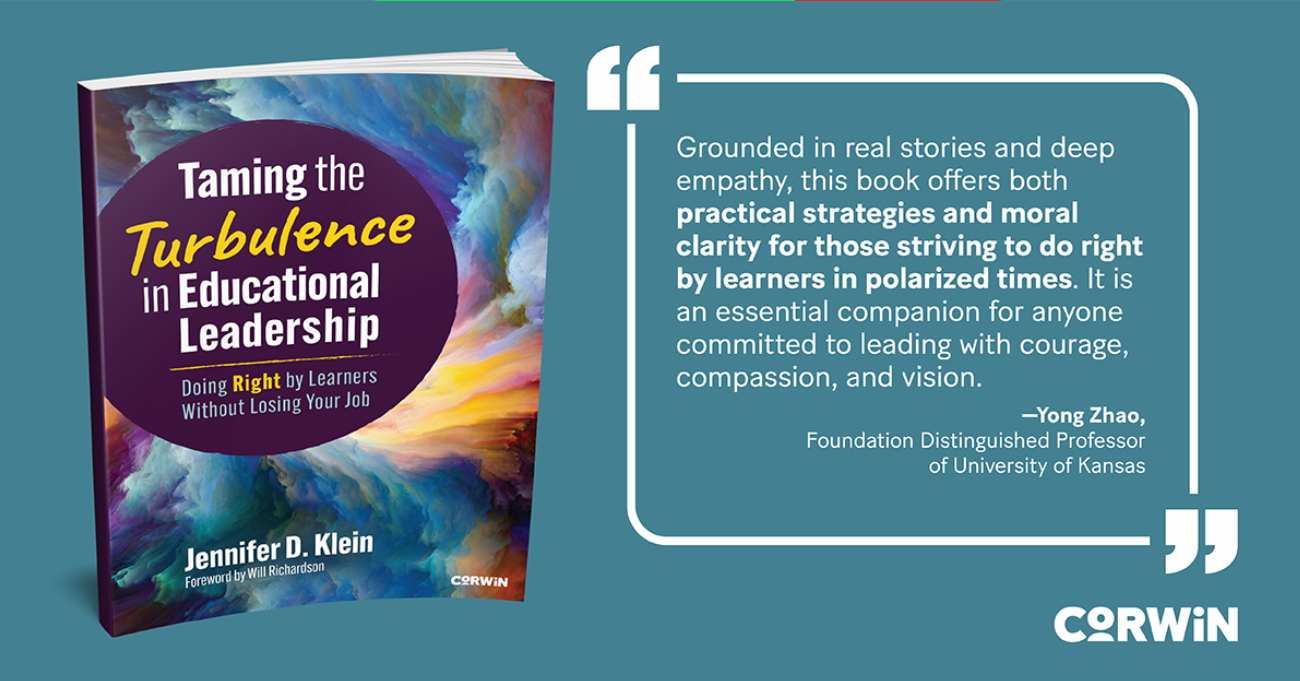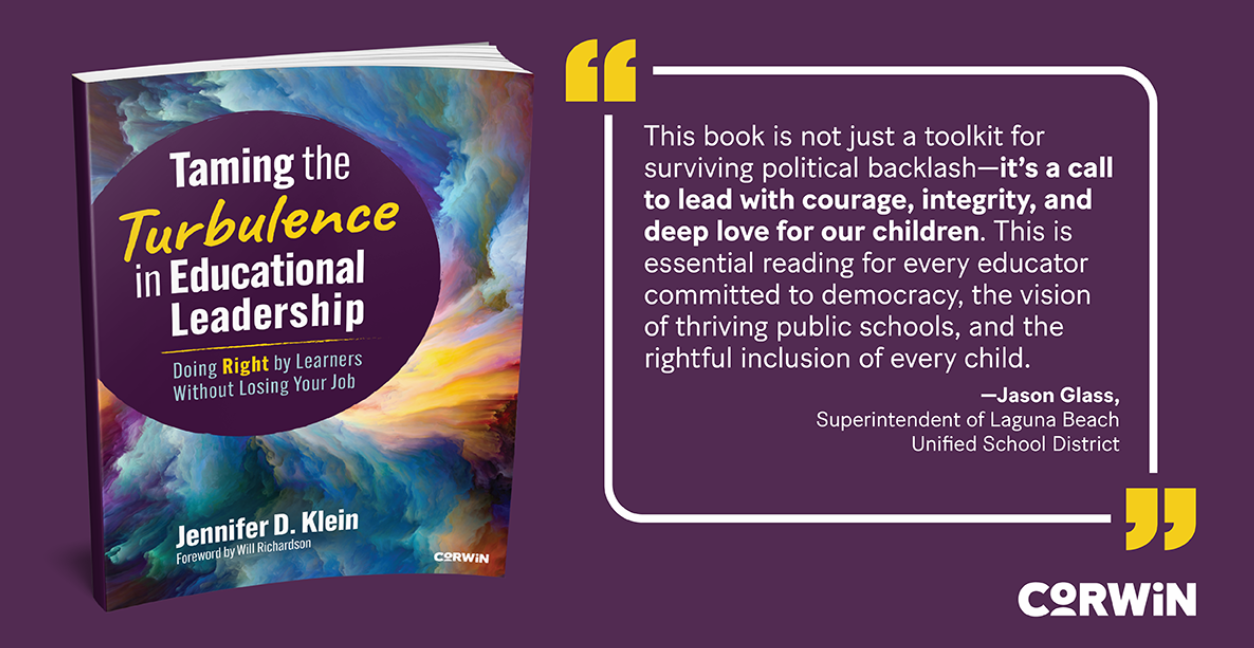Maîtriser les turbulences en matière de leadership éducatif
Agir pour le bien des apprenants sans perdre son emploi
Agir pour le bien des apprenants sans perdre son emploi

Les pressions liées au climat politique et culturel actuel ont créé des obstacles sans précédent pour les chefs d'établissement qui s'efforcent d'assurer la réussite de tous les élèves. Face aux défis croissants posés par les communautés, à la législation conservatrice et aux idées fausses concernant l'enseignement centré sur l'étudiant et les efforts d'inclusion, les dirigeants se sentent souvent isolés et menacés dans leurs efforts pour donner la priorité à ce dont les apprenants ont le plus besoin.
S'appuyant sur des entretiens avec 67 responsables de l'éducation du monde entier, Maîtriser les turbulences en matière de leadership éducatif est un manuel pratique proposant des stratégies pour favoriser une transformation axée sur l'équité et centrée sur les étudiants, même en cas d'opposition. Les fonctionnalités supplémentaires incluent
Enraciné dans des histoires du monde réel, ce livre propose des stratégies solidaires et concrètes aux responsables de l'éducation déterminés à centrer les besoins de tous les apprenants dans des sociétés de plus en plus polarisées.

« Jennifer D. Klein a doté le domaine de l'éducation d'un chef-d'œuvre, qui se lit comme une lettre d'amour à tous les dirigeants qui osent agir comme il se doit envers les apprenants dans un monde de plus en plus réticent au progrès. Maîtriser les turbulences est à la fois un baume et un plan : il nomme les tempêtes, honore la fragilité de nos rôles et trace la voie à suivre pour surmonter la résistance avec clarté, compassion et courage. Klein aborde directement et sans réserve les réalités du leadership d'aujourd'hui, en centrant les étudiants sur l'intention et l'amour tout en honorant la complexité de la gestion des obstacles politiques, culturels et institutionnels. Ce qui enchante le plus, c'est la façon dont le livre intègre des stratégies pratiques et immédiatement utilisables dans le cadre d'une conversation pleine de cœur, ancrée dans la dignité, une présence légitime et le mouvement mondial pour une éducation significative et humanisante. Klein introduit un vocabulaire commun, de puissantes métaphores et des histoires viscéralement réelles qui créent un espace pour une compréhension nuancée et une action courageuse. Que vous soyez chef d'établissement, entraîneur ou défenseur, ce livre propose non seulement des outils, mais aussi de la solidarité. Vous repartirez en vous sentant vu, doté de ressources et appelé à diriger avec humilité et espoir. « ~ Charité Marcella Moran, Ed.S., Auteur | PBLPath.com

« Les vents politiques qui balayent l’éducation menacent de laisser derrière eux une longue traînée de destruction—des coupes budgétaires à l’interdiction de livres, jusqu’au démantèlement des initiatives qui promeuvent l’éducation civique, font progresser l’équité et amplifient la voix des élèves. Les éducateurs sont confrontés à un choix difficile : se baisser et attendre que la tempête passe ; ou offrir aux élèves les expériences d’apprentissage dont ils ont besoin non seulement pour survivre, mais pour s’épanouir dans cet avenir incertain. Avec Taming the Turbulence in Educational Leadership, l’auteure et éducatrice Jennifer D. Klein nous apporte des éclairages et la sagesse d’éducateurs du monde entier qui mènent le changement scolaire avec optimisme et courage. Le message qui les unit, et qui offre de l’espoir à nos communautés polarisées, est simple : Faire ce qu’il faut pour les apprenants. » ~ Suzie Boss, auteure et défenseure de l’apprentissage par projet

« Taming the Turbulence tisse ensemble l’évident et le révélateur, le cœur et la vision, les triomphes et les revers de leaders dans tous les domaines de notre paysage éducatif, d’une manière qui permet au lecteur de discerner une voie à suivre. La vulnérabilité personnelle de Klein dans ses réflexions sur le leadership est honnête et réconfortante. Chaque leader se retrouve dans les pages de ce livre et reçoit des directives et des outils pour continuer à transformer le paradigme que nous appelons école—des outils tels que le “troisième élément” de Tim Carr, créant un point d’appui pour transformer la division en discussion ; une matrice d’évaluation des risques pour aider à déterminer le rythme du changement ; et, mon préféré, un Protocole de Réflexion Centré sur l’Élève, pour placer la voix des élèves au cœur de toute conversation. Il n’y a pas de défi auquel les leaders sont confrontés que Klein évite. Elle aborde les réalités d’inviter les familles à participer au travail du changement tout en s’orientant avec l’Étoile du Nord des valeurs fondamentales de l’école, elle navigue dans l’hostilité actuelle envers la DEIJ en “cultivant la non-conformité créative” (Mari Jones), et elle pratique le soin d’équipe et l’autosoin même lorsque cela semble presque impossible à justifier. Nous avons besoin de ce type d’espoir pratique—de ce partage d’histoires, de ce “tu me vois, donc nous pouvons accomplir cette tâche difficile.” Nous avons besoin d’entendre ce que les leaders de ce livre courageux ont à nous dire. » ~ Erin Sanchez, auteure | PbLPath.com

« Le monde est profondément divisé en ce moment, sur le plan des idées, de la langue et de la politique. Peu importe où vous vous situez dans ce continuum, une chose est claire : les éducateurs ont du mal à avancer. Pour les chefs d'établissement, ce type de courage peut avoir de lourdes conséquences émotionnelles. Dans , Jennifer D. Klein mêle magistralement des histoires, des exemples et des outils pratiques orientés vers l'action. Ensemble, ils aident à clarifier pourquoi cela se produit, quel rôle chacun joue à la fois dans le problème et dans la solution, et comment nous pouvons prendre des mesures significatives pour soutenir tous les apprenants, les soignants et les communautés. Juste au moment où je me sentais un peu désespérée, ce livre m'a rappelé qu'il y avait une voie à suivre partagée, et que nous soyez sur la même longueur d'onde sur ce dont les apprenants ont besoin pour devenir des êtres humains à part entière et prospères. » ~ Robin Whitacre, Leadership Coach | Former Principal | Professional Learning Designer

« Le livre de Jennifer est un buffet gastronomique de tout ce qu’il faut savoir sur le changement transformateur dans le secteur de l’éducation. C’est une ressource incontournable d’idées, d’informations, de pédagogie actuelle, de récits authentiques et pertinents, et en plus, une lecture agréable ! » ~ Robert Landau, Futurist and Strategist, Two Roads Education

« Maîtriser les turbulences en matière de leadership éducatif est un appel à l’action pour les leaders innovants qui refusent de laisser des structures dépassées étouffer l’engagement, la pertinence et la joie d’apprendre. À travers des exemples concrets et des stratégies pratiques, Jennifer D. Klein propose une feuille de route convaincante pour ceux qui ont le courage de remettre en question l’inertie institutionnalisée du statu quo et de créer les conditions d’expériences d’apprentissage authentiques, équitables et transformatrices pour chaque enfant. Nous pouvons, et devons, faire mieux — ce livre offre un guide clair et concret pour y parvenir. » ~ Ben Owens, Co-Founder / Director of Strategy & Innovation, Open Way Learning

The pressures of today’s political and cultural climate have created unprecedented roadblocks for school leaders striving to ensure success for all students. With mounting challenges from communities, conservative legislation, and misconceptions about student-centered instruction and inclusion efforts, leaders often feel isolated and threatened in their efforts to prioritize what learners need most.
Drawing on interviews with 67 education leaders around the world, Taming the Turbulence in Educational Leadership is a practical handbook, offering strategies to drive equity-focused and student-centered transformation, even in the face of opposition. Additional features include
Rooted in real-world stories, this book offers solidarity and actionable strategies to education leaders committed to centering the needs of all learners in increasingly polarized societies.
Download Corwin's one-page flyer about Taming the Turbulence in Educational Leadership.

"Jennifer D. Klein has gifted the field of education a masterwork—one that reads like a loving letter to every leader who dares to do right by learners in a world increasingly resistant to progress. Taming the Turbulence is both balm and blueprint: it names the storms, honors the fragility of our roles, and charts a path through resistance with clarity, compassion, and courage. Klein speaks directly and unabashedly to the realities of leadership today, centering students with intention and love while honoring the complexity of navigating political, cultural, and institutional pushback. What enchants most is how the book wraps practical, immediately usable strategies inside a heart-filled conversation—anchored in dignity, rightful presence, and the global movement for meaningful, humanizing education. Klein introduces a common vocabulary, powerful metaphors, and viscerally real stories that create space for nuanced understanding and courageous action. Whether you're a school leader, coach, or advocate, this book offers not just tools, but solidarity. You’ll leave feeling seen, resourced, and called to lead with both humility and hope." ~ Charity Marcella Moran, Ed.S., Author | PbLPath.com

"Taming the Turbulence weaves together the blatant and revelatory, the heart and vision, the triumphs and setbacks of leaders across every area of our educational terrain in a way that allows the reader to see a path forward. Klein’s own vulnerability in her personal reflections on leadership is honest and affirming. Every leader is reflected in the pages of this book and given the directive and tools to continue shifting the paradigm we label school—tools like Tim Carr’s 'third thing,' creating a fulcrum to turn division into discussion; a risk assessment matrix to help determine the pace of change; and, my favorite, a Student-Centered Insight Protocol to put student voice at the heart of any conversation. There’s no challenge faced by leaders that Klein avoids. She addresses the realities of inviting caregivers into the work of change while wayfinding with the North Star of a school’s core values, navigating the current hostility toward DEIJ by 'cultivating creative noncompliance' (Mari Jones), and practicing team- and self-care even when it seems nearly impossible to justify. We need this kind of practical hopefulness—this story-sharing, this 'you see me, therefore, we can do this hard thing.' We need what the leaders in this brave book have to say to us." ~ Erin Sanchez, Author | PbLPath.com

"The world feels deeply divided right now—across ideas, language, and politics. No matter where you fall on that continuum, this much is clear: educators are struggling with how to move forward. For school leaders, that kind of courage can come with a heavy emotional toll. In Taming the Turbulence, Jennifer D. Klein masterfully weaves together stories, examples, and practical, action-oriented tools. Together, these help clarify why this is happening, what role we each play in both the problem and the solution, and how we can take meaningful steps to support all learners, caregivers, and communities. Just when I was feeling rather hopeless, this book reminded me that there is a shared path forward—and that we can get on the same page about what learners need to grow into successful, whole human beings." ~ Robin Whitacre, Leadership Coach | Former Principal | Professional Learning Designer

"Taming the Turbulence in Educational Leadership is a call to action for innovative leaders who refuse to let outdated structures stifle engagement, relevance, and joy in learning. Through real-world examples and practical strategies, Jennifer D. Klein offers a compelling roadmap for those courageous enough to challenge the institutionalized inertia of the status quo and create the conditions for authentic, equitable, and transformative learning experiences for every child. We can, and must, do better—this book provides a clear and actionable guide for making that happen." ~ Ben Owens, Co-Founder / Director of Strategy & Innovation, Open Way Learning
